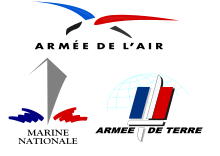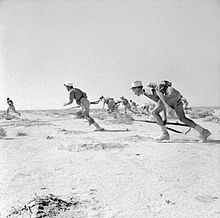French Armed Forces
| French Armed Forces | |
|---|---|
| Forces armées françaises | |
 Logos of the French Armed Forces | |
| Service branches | Army Navy Air and Space Force National Gendarmerie National Guard |
| Headquarters | Hexagone Balard, Paris |
| Leadership | |
| Chief of the Armed Forces | President Emmanuel Macron |
| Minister of the Armed Forces | Florence Parly |
| Chief of the Defence Staff | François Lecointre |
| Manpower | |
| Military age | 17.5 |
| Conscription | None |
| Active personnel | 203,750[1] (ranked 23rd) |
| Reserve personnel | 38,550[1] |
| Deployed personnel | 11,000[2] |
| Expenditures | |
| Budget | US$50.1 billion[3] (2019) (ranked 6th) |
| Percent of GDP | 1.9% (2019)[3] |
| Industry | |
| Domestic suppliers | Airbus Dassault Naval Group Nexter MBDA Safran Thales |
| Foreign suppliers | FN Herstal Heckler & Koch General Atomics Lockheed |
| Related articles | |
| History | Military history of France |
| Ranks | Army ranks Navy ranks Air force ranks |
The French Armed Forces (French: Forces armées françaises) encompass the Army, the Navy, the Air and Space Force, the National Guard and the Gendarmerie of the French Republic. The President of France heads the armed forces as chef des armées.
France has the sixth largest defence budget in the world and the first in the European Union (EU). It has the largest armed forces in size in the European Union.[4] According to Credit Suisse, the French Armed Forces are ranked as the world's sixth-most powerful military.[5]
History[edit]
The military history of France encompasses an immense panorama of conflicts and struggles extending for more than 2,000 years across areas including modern France, greater Europe, and French territorial possessions overseas. According to British historian Niall Ferguson, the French participated in 50 of the 125 major European wars that have been fought since 1495; more than any other European state. They are followed by the Austrians who fought in 47 of them, the Spanish in 44 and the English (and later British) who were involved in 43. In addition, out of all recorded conflicts which occurred since the year 387 BC, France has fought in 168 of them, won 109, lost 49 and drawn 10; thus making France the most successful military power in European history.[6]
The Gallo-Roman conflict predominated from 60 BC to 50 BC, with the Romans emerging victorious in the conquest of Gaul by Julius Caesar. After the decline of the Roman Empire, a Germanic tribe known as the Franks took control of Gaul by defeating competing tribes. The "land of Francia," from which France gets its name, had high points of expansion under kings Clovis I and Charlemagne. In the Middle Ages, rivalries with England and the Holy Roman Empire prompted major conflicts such as the Norman Conquest and the Hundred Years' War. With an increasingly centralized monarchy, the first standing army since Roman times, and the use of artillery, France expelled the English from its territory and came out of the Middle Ages as the most powerful nation in Europe, only to lose that status to Spain following defeat in the Italian Wars. The Wars of Religion crippled France in the late 16th century, but a major victory over Spain in the Thirty Years' War made France the most powerful nation on the continent once more. In parallel, France developed its first colonial empire in Asia, Africa, and in the Americas. Under Louis XIV, France achieved military supremacy over its rivals, but escalating conflicts against increasingly powerful enemy coalitions checked French ambitions and left the kingdom bankrupt at the opening of the 18th century.
Resurgent French armies secured victories in dynastic conflicts against the Spanish, Polish, and Austrian crowns. At the same time, France was fending off attacks on its colonies. As the 18th century advanced, global competition with Great Britain led to the Seven Years' War, where France lost its North American holdings. Consolation came in the form of dominance in Europe and the American Revolutionary War, where extensive French aid in the form of money and arms, and the direct participation of its army and navy led to America's independence.

No comments:
Post a Comment